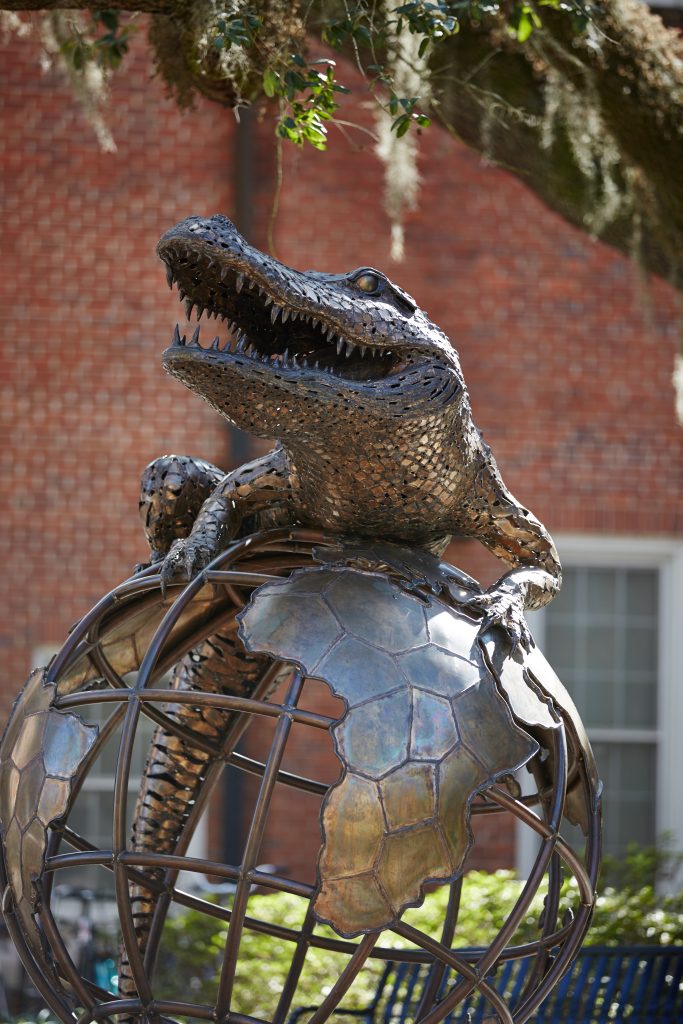Master of science in TOURISM, HOSPITALITY & EVENT MANAGEMENT
Elevate your career with the University of Florida’s Master of Science (M.S.) in Tourism, Hospitality & Event Management (THEM). This program empowers you to shape thriving destinations, businesses, and experiences in the dynamic tourism and hospitality industry.
You’ll develop advanced expertise in analytics, management, and strategic decision-making, opening doors in global travel, hospitality, events, research, and entrepreneurial ventures. As a UF student, you’ll learn from distinguished faculty leaders and benefit from cutting-edge industry partnerships and AI-driven curriculum.
The program prepares you for top-tier roles in public and private sector organizations, destination planning agencies, hospitality companies, and event management firms. Graduates are highly competitive for doctoral study or leadership positions in tourism, hospitality, and allied fields.
Info for Prospective Students
Join one of the most dynamic and fast-growing industries in the world.
Admissions
Admission to UF’s Tourism, Hospitality & Event Management M.S. program is your first step toward joining a vibrant network of innovators and leaders. Whether you’re just starting out or bringing years of industry experience, our streamlined application process makes it simple to take the next step. Discover the requirements and deadlines below, and begin your journey to making an impact in this dynamic field.
Application Deadlines
To ensure the highest likelihood of a timely review for a particular semester, please submit all application materials to the department by the deadline. We recommend you submit your application as soon as possible rather than waiting until the deadline.
- Spring: October 1 (May 1 for non-US residents)
- Fall: April 15 (January 15 for non-US residents)
Late applications may still be considered for review depending on program availability. Admission decisions will be released by late March for fall applicants who apply by the deadline and November for spring applicants. Incomplete applications will not be reviewed.
Admission Requirements
- A recognized baccalaureate, graduate or professional degree from a regionally accredited U.S. institution or a comparable degree from an international institution.
- For applicants with a bachelor’s degree only, a minimum grade point average of B (3.0), calculated from all grades and credits after the semester in which the applicant reached 60 semester hours or 90 quarter hours.
- While we are no longer requiring the GRE or GMAT, we will still be assessing your verbal and quantitative abilities.
- For verbal assessment we will consider:
- TOEFL scores (if applicable)
- Statement of Purpose
- For quantitative assessment we will consider grades in:
- Math-based natural science courses (e.g. Physics, Chemistry, Astronomy, etc.)
- Applied and Theoretical Math courses (e.g. Accounting, Finance, Statistics, College Algebra, etc.)
- For verbal assessment we will consider:
- For applicants from countries where English is not the official language, UF requires proficiency in spoken and written English and accepts the results of the Test of English as a Foreign Language (TOEFL) or the International English Language Testing System (IELTS).
- Minimum scores acceptable for admissions are:
- TOEFL: 550 (paper test); 80 (internet based)
- IELTS: 6
- International applicants are exempt from the English proficiency requirement if enrolled for one academic year in a degree-seeking program at a recognized/regionally accredited university or college in a country where English is the official language prior to your anticipated term of enrollment at UF, or if you are from one of the exempt countries. Have scores sent to UF institution code 5812.
- Minimum scores acceptable for admissions are:
- Satisfactory conduct record
- Proof of medical immunization
How to Apply
To expedite your application process, e-mail unofficial copies of application items listed (e.g. unofficial transcripts, letters of recommendation, GRE scores) as attachments to the graduate coordinator.
- University of Florida Graduate School Application submitted and application fee paid
- Statement of Purpose: Tell us why you want to attend our graduate program, what you want to do after your degree and any relevant experience you have.
- Transcripts:
- Arrange to have official transcripts sent to the UF Office of Admissions from each postsecondary institution attended.
- Mail original transcripts to Graduate Admissions located at 201 Criser Hall, PO Box 114000, Gainesville FL 32611-400.
- If you attended UF as your postsecondary institution, you do not have to order a transcript from the Office of the University Registrar.
- International applicants must submit official transcripts, mark sheets, and examination certificates in the native language for all secondary and/or postsecondary coursework, along with certified, literal English translations for documents not originally issued in English.
- Arrange to have official transcripts sent to the UF Office of Admissions from each postsecondary institution attended.
- TOEFL Test Score:
- Arrange to have the testing facility send official test scores to institutional code 5812.
- TOEFL scores are only valid for two years from date they were taken.
- Resume/Curriculum Vitae: Pursuant to Florida Statute, your application requires inclusion of all post-high school education and employment, as well as information about ongoing international affiliations and research funding.
- Three letters of recommendation (PDF):
- At least two letters should come from an academic source (e.g. prior college instructor, academic advisor, etc.). The third letter can be from someone known to you in a professional or academic capacity.
- Letters can be submitted electronically through the online application or mailed directly to the department.
Application Status
You may submit your application any time before the deadline. Applicants are encouraged to submit supplemental material as soon as possible to avoid a delay in processing.
You can check the status of your application at any time here.
Admissions Decision
Applicants typically receive an admissions decision — accepted or denied — within two weeks of submitting a completed application.
Admitted students will receive further instructions regarding orientation, how to register for courses and required textbooks and materials.
Curriculum
Crafted to prepare you for leadership in a rapidly evolving industry, courses focus on tourism analytics, destination development, crisis management, and natural resource recreation. You’ll gain both broad knowledge and specialized expertise.
The Master of Science in Tourism, Hospitality & Event Management is a 30-credit-hour degree and offers two concentrations and two specializations. The THEM degree provides coursework focused on Tourism, Tourism Analytics, Destination Development, Crisis Management and Natural Resource Recreation. Students can choose between three options: thesis, non-thesis with practicum, or non-thesis with professional paper.
Required Core
- LEI 5188: Trends & Issues in Tourism & Recreation Management (3 credits)
- HLP 6535: Research Methods in Health and Human Performance (3 credits)
- HLP 6515: Evaluation Procedures in Health and Human Performance (3 credits)
- LEI 6971: Research for Master’s Thesis (6 credits)
Electives
Students can choose a focus area from the list below or customize a degree plan with directed electives approved by an advisor:
- Tourism Concentration (8 credits)
- Natural Resource Recreation Concentration (9 credits)
- Tourism Analytics Specialization (12 credits)
- Destination Development and Crisis Management Specialization (9 credits)
- Online Hospitality Business Management Specialization (12 credits)
Tourism and Hospitality Management Courses
- LEI 6931 Tourism & Hospitality Business Perspective (2 credits)
- LEI 6931 Strategic Hospitality Business Management (2 credits)
- LEI 6931 Revenue Management in Hospitality Business (2 credits)
- LEI 6931 Brand Strategies in Hospitality and Tourism (2 credits)
- LEI 6931 Destination and Hospitality Crisis Management (2 credits)
- HMG 6747 Marketing in Hospitality and Tourism (2 credits)
Suggested Electives
- LEI 6903: Readings in Recreation, Parks, and Tourism
- LEI 6905: Directed Independent Study
- LEI 6910: Supervised Research
- LEI 6931: Sustaining Humans & their Environments – New Zealand
- LEI 6931: Sustaining Humans & their Environments – Australia
- LEI 6931: Sustaining Humans & their Environments – Fiji
Note: LEI or HMG courses from each of the concentrations and specializations can be taken as directed electives with advisory committee approval. Up to 6 credits of elective courses can be taken outside of the Department. These courses must be approved by the student’s advisory committee.
Required Core
- LEI 5188: Trends & Issues in Tourism & Recreation Management (3 credits)
- HLP 6515: Evaluation Procedures in Health and Human Performance (3 credits)
- HLP 6535: Research Methods in Health and Human Performance (3 credits)
Choose one course for 3 credits:
- LEI 6944: Practicum in Tourism and Recreation Management
- LEI 6905: Professional Paper
Electives
Students can choose a focus area from the list below or customize a degree plan with directed electives approved by an advisor:
- Tourism Concentration (8 credits)
- Natural Resource Recreation Concentration (9 credits)
- Tourism Analytics Specialization (12 credits)
- Destination Development and Crisis Management Specialization (9 credits)
- Online Hospitality Business Management Specialization (12 credits)
Tourism and Hospitality Management Courses
- LEI 6931 Tourism & Hospitality Business Perspective (2 credits)
- LEI 6931 Strategic Hospitality Business Management (2 credits)
- LEI 6931 Revenue Management in Hospitality Business (2 credits)
- LEI 6931 Brand Strategies in Hospitality and Tourism (2 credits)
- LEI 6931 Destination and Hospitality Crisis Management (2 credits)
- HMG 6747 Marketing in Hospitality and Tourism (2 credits)
Suggested Electives
- LEI 6108: Contemporary Theories of Recreation and Leisure
- LEI 6439: Campus Recreation Administration and Programming
- LEI 6326: Sport Tourism
- LEI 6351: Heritage Tourism
- LEI 6557: Recreation Management in the Coastal Zone
- LEI 6895: Tourism Theory and Concepts
Note: LEI or HMG courses from each of the concentrations and specializations can be taken as directed electives with advisory committee approval. Up to 6 credits of elective courses can be taken outside of the Department. These courses must be approved by the student’s advisory committee.
Required Core
- LEI 5188: Trends & Issues in Tourism & Recreation Management (3 credits)
- HLP 6515: Evaluation Procedures in Health and Human Performance (3 credits)
- HLP 6535: Research Methods in Health and Human Performance (3 credits)
Choose one course for 3 credits:
- LEI 6944: Practicum in Tourism and Recreation Management
- LEI 6905: Professional Paper
Electives
Students can choose a focus area from the list below or customize a degree plan with directed electives approved by an advisor:
- Tourism Concentration (8 credits)
- Natural Resource Recreation Concentration (9 credits)
- Tourism Analytics Specialization (12 credits)
- Destination Development and Crisis Management Specialization (9 credits)
- Online Hospitality Business Management Specialization (12 credits)
Tourism and Hospitality Management Courses
- LEI 6931 Tourism & Hospitality Business Perspective (2 credits)
- LEI 6931 Strategic Hospitality Business Management (2 credits)
- LEI 6931 Revenue Management in Hospitality Business (2 credits)
- LEI 6931 Brand Strategies in Hospitality and Tourism (2 credits)
- LEI 6931 Destination and Hospitality Crisis Management (2 credits)
- HMG 6747 Marketing in Hospitality and Tourism (2 credits)
Suggested Electives
- LEI 6108: Contemporary Theories of Recreation and Leisure
- LEI 6439: Campus Recreation Administration and Programming
- LEI 6326: Sport Tourism
- LEI 6351: Heritage Tourism
- LEI 6557: Recreation Management in the Coastal Zone
- LEI 6895: Tourism Theory and Concepts
Note: LEI or HMG courses from each of the concentrations and specializations can be taken as directed electives with advisory committee approval. Up to 6 credits of elective courses can be taken outside of the Department. These courses must be approved by the student’s advisory committee.
Concentration
A concentration is a subprogram in a major that is approved by the Graduate Council and may appear on the student transcript. Concentration options include:
- Tourism Concentration (8 credits)
- Natural Resource Recreation Concentration (9 credits)
Specialization
A specialization allows students maximum flexibility to choose prescribed coursework that relates to personal and career interests. Specializations do not appear on student transcripts. Specialization options include:
- Tourism Analytics Specialization (12 credits)
- Destination Development and Crisis Management Specialization (9 credits)
Designed to fit your needs—choose from online or in-person enrollment. Both formats provide the same high academic standards, but please note that only the 30-credit non-thesis options are available online, while in-person students can select either non-thesis or thesis tracks. This flexibility allows you to pursue your degree in the way that works best for your goals.
70%
Secured Full-Time Employment
Nearly 70% of graduates secure full-time employment upon graduation.
3.5
Student-to-Faculty Ratio
Experience exceptional support with our low student-to-faculty ratio—just 3.5 students for every faculty member—ensuring you receive personalized mentoring and guidance throughout your journey.
#5
Ranked Public University
2026 Forbes Report Ranks UF No. 5 Among Public Universities in the Nation
Career
Unlock dynamic career opportunities in global tourism, hospitality, and event management—with a UF degree that sets you apart as a leader in a thriving industry.
Career Growth Projections
Fuel your future in a booming industry: The U.S. Bureau of Labor Statistics projects 8% job growth for meeting, convention, and event planners and 7% growth for lodging managers by 2032—well above the national average for all occupations. Globally, the World Travel & Tourism Council predicts nearly 430 million jobs in travel and tourism by 2033, making this the perfect time to launch your career in a dynamic, expanding field.
Industry Demand for Skills
Major organizations—including the National Commission for Health Education Credentialing (NCHEC) and the Society for Public Health Education (SOPHE)—recognize the growing demand for professionals with expertise in health program planning, public health communication, data analysis, grant writing, and community engagement. As the field moves toward telehealth and technology-driven solutions, digital health literacy and evaluation skills have become more valuable than ever, making these advanced competencies essential for today’s health leaders.
Where Your THEM Skills Can Take You
Unlock a world of opportunity with the skills gained in UF’s Master’s in Tourism, Hospitality & Event Management—top employers across the industry are searching for leaders just like you.
- Hotels & resorts rely on dynamic professionals to drive guest experience, revenue management, financial planning, business leadership, and crisis management.
- Event planning firms demand experts in project coordination, strategic marketing, vendor management, communication, and creative problem-solving.
- Cruise lines and travel companies seek innovators with skills in planning and development, recreation management, customer service, and business administration.
- Destination marketing organizations need strategists fluent in brand management, research analytics, stakeholder relations, and sustainable tourism.
- Restaurants and food & beverage operations require managers skilled in marketing, team leadership, financial operations, and guest services.
Tuition
Compare the cost per credit for in-state, out-of-state or online programs.

Graduate Student Funding Opportunities
Financial Aid
Learn more about financial aid for graduate students.
Graduate Assistantships
While we do not provide assistantships for master’s level students in our department, the organizations below offer graduate assistantships on campus:
- Recreational Sports
- University Athletic Association
- Stephen C. O’Connell Center
- J. Wayne Reitz Union
- Office of Student Affairs
- Division of Housing
Federal Loans
Filling out the FAFSA is the first step in receiving federal student aid. Loans are borrowed funds which must be repaid with interest after you are no longer a student. Review details about loans programs available at UF.
Campus Employment
The University lists job openings for which colleges, departments, programs and other UF units are seeking graduate students for hire. View UF job openings.
Grant and Travel Funding Opportunities
Faculty
Our faculty are trailblazers in tourism, hospitality, and event management—bringing industry expertise, groundbreaking research, and global connections straight into the classroom. At UF, you’ll learn from leaders who shape the future of the field and are passionate about empowering you to reach your career goals. Experience mentorship and insight from a faculty team dedicated to your success, every step of the way.
















